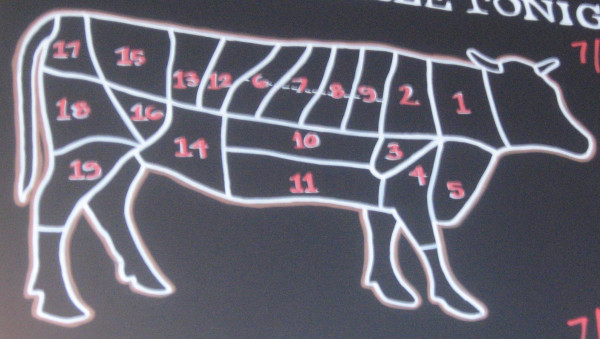“I actually didn’t eat beef growing up,” he said, with a sly smile, “because of my parents.” The thought – that perhaps he believed the silly religion of his Indian parents – was brushed away like dust off his shoulder, accepted by everyone else at dinner freely. “But then I tried steak, and it was over.” The end. His past, how he was raised, be damned. He was a regular, steak-loving American.
I wondered how to respond. Six months ago, I decided to become vegetarian. However, I was never raised vegetarian, and few in my Indian family are. Unlike his family, we ate beef, albeit infrequently, as our particular version of Hinduism only prohibits meat-eating on certain days of the year. No. It was a greater decision than that.

Today, I know many more Indian-American steak and meat lovers (including my own brother) than Indian-American vegetarians. This isn’t just Hindus who love beef, but also Indian Muslims who eat pork. But it is more than them just eating it. It’s how much they let the meat they eat define themselves. Somehow, in our quest to adapt to a new culture, we’ve taken a symbol of American consumerism to an extreme.
This isn’t just happening here. In India itself, as is the case in China, Thailand, Vietnam, and other developing countries, meat consumption is rising quickly. The ancient Hindu and Buddhist beliefs that deplore the killing of animals are being replaced by consumerist beliefs that consumption trumps all. As long as you can afford it, you should eat it. Meat, heavily features in the cuisines of France, England, and yes, America, is now a symbol of prosperity to millions.
This is leading to some scary facts. Dramatic over-consumption of exotic species such as Turtles and Blue Fin Tuna by Asian countries threatens extinction, much like how European immigrants rampaging of Bison led to their extinction here. Meat is also a major source of climate change pollution. CAFO – massive factory meat farms that dot the American Midwest but can also be found in Mexico, China, and parts of Africa, release huge amounts of methane, and are incubators for disease. Remember Swine Flu? It had been traced to hormone usage in a Mexican CAFO.
And this doesn’t even consider the massive overusage of land to make feed for meat. But here’s a simple fact. It takes, on average, nine pounds of grains to produce one pound of meat. Starvation, famine, deforestation, climate change. It’s all connected.
That is why I’m vegetarian. To reduce my impact by consuming less of not only meat, but processed foods in general, promoting a more human world. The fact that this is also the basis of Hindu and Buddhist beliefs is no coincidence. These thought systems are based on thousands of years of wisdom based in deep observation of nature. Wisdom that our world, in its rush to consume, could use.
Similarly, Native American cultures also understood this – hunting was only allowed when animal populations were at certain levels, during certain seasons, and fish could only be caught if they were a certain size. Cyclical time was based on maintaining balance with nature.
Indigenous systems along with Hinduism and Buddhism can teach us a lot. Yet, we let consumerism drive how we live. When I see Indian-Americans defining themselves by what they consume, it seems forced, artificial, and, sad. When my dinner mate exhibited that sly smile, he was putting down down the culture of his parents, the experience of the generations that preceded us, devaluing their beliefs, their knowledge.
I ended up saying nothing. I ate meat for 29 years of my life, so to judge others would be hypocritical. My seatmates had already bought into the system of consumerism that I detested, to explain my beliefs to them would be antithetical. Had I said I was vegetarian, I would be automatically grouped with his ignorant family and the culture of another world. My own long process to this choice would have been dismissed in the same way that first steak pushed aside the way he was raised.
To them, what they eat is who they are. For me, my diet expresses my values. For Indian steak lovers, there diet expressed who they want – or are trying – to be. Nature be damned.
photo credit: Ron Dollete via photopin cc









